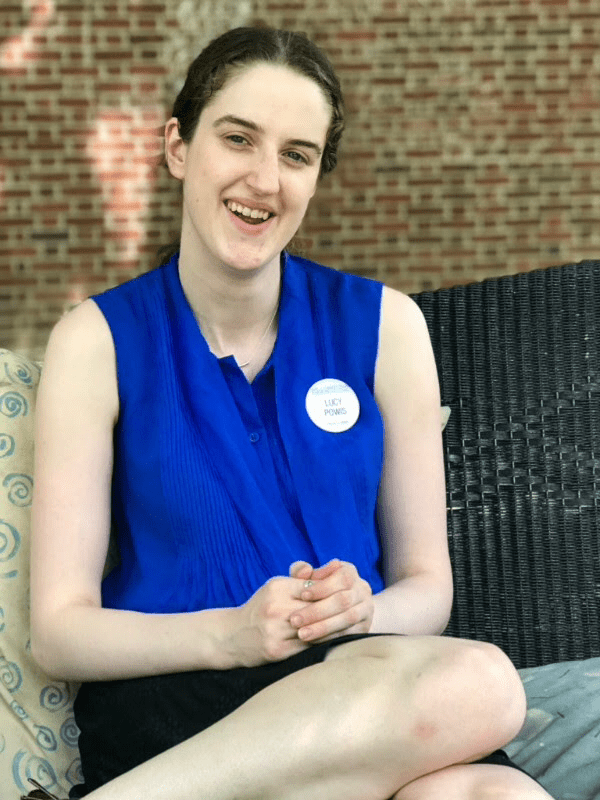Five Questions with Lucy Powis

So you’re a dramaturg. What inspired you to pursue dramaturgy?
I discovered it while I was in undergrad as a devised theatre major. At that point, I was a bit of a generalist, as we were encouraged to be—I’d done some acting, directing, writing, stage managing, you name it, and enjoyed them all but didn’t want to pursue them as careers. I also had an interest and a background in arts education, but didn’t know that I wanted to be a teacher, per se. I was introduced to dramaturgy in a couple of classes with Judith Rudakoff, and fell in love with it immediately. I think that dramaturgy is part of every job in the theatre—every choice that a designer or director or writer makes is a dramaturgical one—but being a dramaturg in particular excited me because it allowed me to synthesize skills that I had built in other roles and to wrestle with questions about how the way we program a season, tell a story, or run a talkback affects audiences. You get to work on the macro and micro level in a really satisfying way—one minute you could be asking those questions, and the next you could be debating a word choice.
What are you working on?
I just finished associate producing Between the Threads (Jewish Women Project) at HERE, which was a great return to devised theatre. I got to do some talkback curating and moderating as well, which was great. I’m now working on two shows as part of the LPAC Rough Draft Festival. I’m dramaturg for How to Mourn an American (An Instructional), which is a solo show that follows the Statue of Liberty as she reckons with death throughout American history, and producer for PROSPERITY! which is a Brechtian drag epic about the reality of chasing the American dream. While they’re incredibly different stylistically, both pieces really dig into privilege afforded by race, class, gender, or sexuality and how that impacts everyone living in this country.
What do you look for in a working relationship with a playwright?
Honesty! First and foremost, I don’t want to work with someone who doesn’t want to work with me or work with a dramaturg in general. I also don’t want to work with someone who feels obligated to listen to me. The more open people are about what they want out of a dramaturgical collaboration, and what is and is not useful for them, the better. And that doesn’t have to be something that you know at the top of a process—it’s something you can keep discussing and discovering as you collaborate further. I love being in meetings with people who aren’t afraid of disagreement or saying no, because it challenges us both to refine our ideas. If either person is holding something back or ignoring their instincts, they might as well not be there.
What advice would you give to an aspiring dramaturg?
Have conversations with people with whom you want to collaborate about what dramaturgy could look like. Keep pursuing other interests—be they in the theatre, or outside of it—because everything that excites you or that you have skill in will enrich your arsenal as a dramaturg.
Don’t pressure yourself to be a one-size-fits-all practitioner. Something that I really appreciated about being in the dramaturgy program at Columbia is that being in a class of 6 dramaturgs and rotating through collaborators in other programs made it easier to accept that I am not suited to work with everyone or on every project. Yes, it’s an adaptable job, but that doesn’t mean you have to be able to transform to fit any situation. Every dramaturg is unique and brings different things to the table, just as every designer or director or actor does.
Being a dramaturg often means you have to wear many hats and juggle multiple projects. Why do it anyway?
I think that’s the reason why I do it! I’ve always had overcommitment issues, so taking on too many projects doesn’t scare me. The different manifestations that the job can have are what excites me about it. Recently, I have been doing a lot more work where I’m labelled as a producer, because I think it’s the same job with a bit more math involved. You’re a little on the outside, keeping your finger on the pulse of the project and the overall vision, changing what you do from day-to-day to suit the needs of the project, and always advocating for your team and the audience. The more I do it, the more I open my definition of what a dramaturg or producer does, and that just makes me want to do it more.
Lucy Powis is a dramaturg, producer, and arts administrator based in New York City. She is the House Program Coordinator at Lincoln Center for the Performing Arts, and previously worked as the Literary Assistant at Williamstown Theatre Festival and the Artistic Apprentice at Roundabout Theatre Company. She has developed work with Fresh Ground Pepper and NYTW’s 2050 Fellowship. Most recently, she associate produced Between the Threads (Jewish Women Project) at HERE. She is a recent graduate of Columbia’s MFA Dramaturgy program and a proud member of LMDA. Upcoming: dramaturg for How to Mourn an American (An Instructional) and producer for PROSPERITY!, both at the LPAC Rough Draft Festival. www.lucypowis.com
